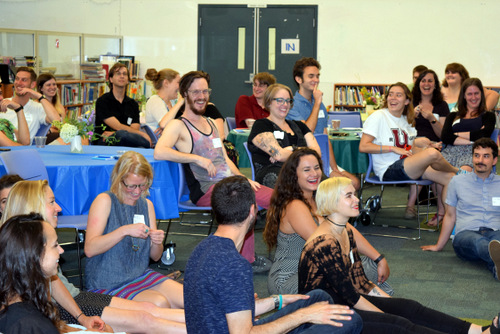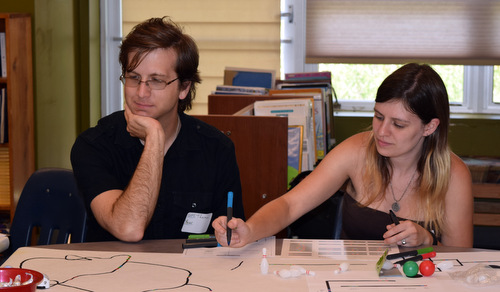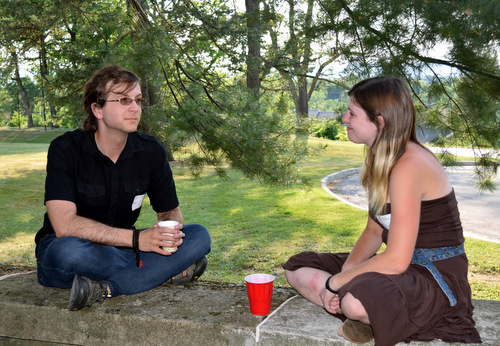
Nothing's Gonna Change My World ««« 2016 »»» The Moment of Now
06.25.16
-Rumi
If you wish to shine like the daylight, burn up the night of self-importance. Dissolve the self like copper in the elixir; dissolve in Him who fosters all existence. But you are bound by the discord of "I" and "We." The cause of your ruin is this sad dualism.
Amber's Middle School Reunion

I skipped my own ten-year high school reunion. It was held at a bar a few miles from where I then lived and was nothing school sanctioned - Beacon High School barely cared about us when we were students and grew no fonder when we left its hallowed halls for community colleges and SUNY schools that turned us into realtors and middle school math teachers.
I had vague intentions of going. When the hour struck, I felt a wave of depression that I was a semi-employed substitute teacher, laid off from a proofreading job; a failed writer who could not manage to sell a novel to a publisher; living in a studio apartment I could barely afford; unmarried and dating an acerbic college student who would surely mock me for the classmates I once had. In total, I felt like too much of a failure to show my face, no matter how casual and loose this reunion was going to be. My social anxiety made abundantly clear I would not leave my apartment for anything short of a fire.
I saw photos of it later and, without bitterness, do not feel I made the wrong decision, even if I made it for the wrong reason. These handful of smiling people were my classmates, yes, but they were never my friends. I socialized more with the class ahead of mine, who surely reunited at a different bar the year prior. If I was to be reunited, it should be with people who would have noticed my absence.
All this is preamble to the fact that Amber brought me to her middle school reunion. If you are confused about the idea that someone would hold a middle school reunion, that is because they wouldn't. For everyone but Amber, this was a high school reunion. Amber's family could not afford to keep her in the liberal private school past eighth grade, after which she attended the local public school and did not touch an art supply until changing her major from criminal justice in college. Had she continued at Poughkeepsie Day School, most of these would have been her graduating class, one she lost four years early.
I had known a few people who managed to graduate this school years ahead of Amber's classmates. If one intended to professionally run live action role playing games or paint elegant watercolor sodomy greeting cards, there were few better places to have matriculated. If one wished to be a certified public accountant or IRS agent, a manager at Sears or business mogul, one would be better served elsewhere. And, of course, if one's parents couldn't afford the college-level annual tuition, don't let the door hit you on the way out.
I hold this school in high enough regard that I have applied to teach there a dozen times since getting my certification. How could I not? I like nothing so much as the questions of rich, left-brained children. Any perceived bitterness in regards to the school should be chalked up to the fact that I have not been interviewed and hired, so my ownership of the school is only glancing hopes. They do amazing work for a very select few children, though I flatter myself to think I might work wonders if I could be similarly selective in my students. If I, like Poughkeepsie Day School, could decouple my students' progress from the notion of grades, if I could let them get passionate about their interests, if I could let them be learners, what miracles might result?
When we arrive, Amber is immediately embraced by a pretty woman in thick rimmed classes. "I'm so glad to see you!" When the woman walks back in to the reunion proper, I turn to Amber to ask who that was.
"I have no idea. I am just very recognizable."

This boast is undercut by the woman at the front desk, who tries to sell Amber entry twice using the same spiel.
Amber was invited by a woman named Amie, whom she assures me was her middle school best friend and whose name I doubt I have heard prior. Though, to be fair, I have yet to have that all important "who were my besties in middle school" conversation with Amber, so I cannot fault her for my ignorance.
Despite how recognizable my wife feels she may be, no one but Amie and the initial woman goes out of their way to acknowledge Amber. We enter a room with fifteen other people comprising not only Amber's intended class but whatever other years saw fit to spend twenty dollars to spend the day in their old school (though the building itself might be in a new location, the concept of the school remains fixed).
Strangers give lingering glances, searching my nametag to figure out whether they are meant to know me. When they cannot find a graduating year, they give a tight smile and turn away as though I have vanished.
Amber and I get sandwiches - a couple of Jacksons earn us access to a catered lunch and dinner - and settle at an unoccupied table, among the first people to do so. Our hope is that people, specifically people Amber ought to know, will follow suit and join us. Instead, a middle aged man and woman join us, the kryptonite of friendly twenty-somethings.
"Why are we at the old people table?" Amber whispers to me in feigned desperation.
"Luck of the draw?"
They both are friendly. The man, Ben, is the incoming head of the school. He asks what I do and I tell him I am an author and teacher to juvenile delinquents.
"That must be very rewarding. How did you get that job?"
"I applied to the civil service list. Three years later, I was offered a job. I think it is a form of socialism, actually."
"What about being an author? How is that going?"
"Slowly," I assure him. "I think I need a bigger publisher."
"When I was writing, I was more concerned with getting a publisher interested at all."
I give him my card, figuring this is precisely the sort of connection I ought to have. I quipped to Amber, half-serious, that I wanted to schmooze with her classmates in hopes one of them had connections in the publishing industry. As I understand it, nine-tenths of getting an agent is talking to the right person at a cocktail party.
Someone associated with the reunion gets the idea to put on a CD from a former musical the students created. Whereas most schools are content to mine the catalog of Rogers and Hammerstein, PDS has their students spend a semester writing then another semester staging an original work. Innovative and it skirts copyright nicely but, as they are fully willing to admit, a school this small has a limited number of singers and they are obliged to work with what they have. Which is to say more plainly that the song leaking from the speakers is tuneless but confident.
As I eavesdrop into the conversations of reunited classmates, I feel like an angel, separate from their experiences, their inside jokes. I understand the syntax, the cadence of their voices, but none of it pertains to me. Since I am irrelevant to them, no one expects me to join in, which is a comfortable position. Amber is in a similar boat, but it is clear from context when one is meant to laugh knowingly and she does on the edges of their conversations.
They bond over the fact that this school drilled The Jabberwock into them the way public schools indoctrinated us with the Pledge of Allegiance. I wonder who Amber would have been with four more years in this world. She might have been an artist far sooner or she just as likely might have rebelled against the rebels and resorted to full-time cashiering.
There is a schedule of the day but, as this is PDS, the next sliver of time is devoted to wandering. "You can do it or not," says Amie. "It's up to you. You all have little books so you can write down any memories you want to share when we get together again."
To facilitate those of us estranged enough to hop right to an activity, there is a crossword puzzle with clues that can only be found on yellow pieces of paper scattered around the buildings. There is no reward for solving the puzzle, since they were taught to honor intrinsic rewards rather than things of actual value. Still, it directs our action away from the growing crowd ignoring us and Amber is eager to show me the school as she remembers it.
She skips, sometimes literally, between emotional landmarks. Here is where she attended kindergarten, there is where her father worked on computers to defray the cost of tuition, there is where she bit a teacher's hand for motioning he was about to choke her. Without her parents' divorce, she might have a dozen more of these tent poles on which her life draped, though she doesn't begrudge that she went to public school, as I would.
She fills in clues as she goes, though she doesn't come close to completing the puzzle or caring that she didn't.
When we return to the room, our table has been occupied. We move out belongings to another.
As we move, Amber thinks she recognizes a woman with a flower in her hair, who is in the midst of a casual conversation. The woman couldn't be colder to Amber in telling her that she doesn't know her.
"To be fair," I say to the floral woman, "you are distinctive."
She does not bother to acknowledge I have dared to speak in her illustrious presence.
I overhear the occupiers talk of the sex lives of their former teachers, revealed during drunken house parties all the students seem to have attended. If a public school teacher so much as mentioned to a student conducting a reading at a bookstore, he would be hauled into an ethics hearing, so this man's talk of playing Risky (like Risk, but played with shots of whiskey) shocks me.
"And we were there," says one, reminiscing, "and Mr. X's son said, 'Hey, we're all going to the strip club!' And Mr. X said, 'I told you never to bother your mother at work.'"
All at his table guffaw at the memory.

After this, people volunteer to share their memories in front of the group. I tease Amber, asking if she is going to divulge something they all might recall from seventh grade. They mention the harmlessness of their senior pranks - filling offices and cars with balloons, running underwear up the flagpole the morning before a thunderstorm, painting the number of their graduating class on the parking lot, the school threatening the students with a call to their colleges for daring to take a senior skip day - and how they were cast as Juliet in a musical retelling of Romeo and Juliet so the director could see them in a dress. One of the teachers gets up to tell a story of her own time as a student here, but she digresses from her digressions until she is ushered back into the crowd before it can delve further into her own teachers' sexual misadventures. The students goad her into revealing the three rules of PDS, though they can all only agree that "windows are not doors." After that, it is possible that tables are not chairs and doors are not floors, though this last one was arguably selected because it rhymes.
Amie gets up and mentions how there was a year where every teacher was reading Beowulf, so she opted to get up and leave whatever class dared to insult her ears with Middle English and find a new one, until that teacher read Beowulf as well.
Until it is time for dinner in another building, we separate to classes. Amber selects a robotics class, which amounts to drawing colored lines to induce half-spherical bots to twirl and speed up. Others assemble upcycled material into what looks to be post-apocalyptic dream catchers or tell each other more stories about their time in PDS.
Amber and I head to dinner on time in hopes that we will trick someone into socializing with us through proximity. We situate exactly where we expect people to sit for dinner. They leave us a table to ourselves, sitting on the stone floor and pillars rather than so much as pulling a chair from us. Someone drags over four guitars of varying sizes and a sing along breaks out of songs we don't know.
We decide we have had enough of dinner and take our leave.
I cannot fault them for ignoring me, an irrelevant observer, though I am more than able to begrudge a little that they don't glory in Amber's presence. They are reviving or remembering bonds a decade fallow and have only a little time until these passionate, privileged people again scatter to the wind. They need to prioritize their time if they are going to feel this was worth their time and effort, because they are more than likely going to ignore one another outside of social media for another decade. Life doesn't allow profound connections to last long, not even for the adult versions of liberal private school kids. In their shoes, I would do nothing but hold the hand of the prom date I neglected the morning after, try to pretend I will totally call the man who resembles my former best friend - less a bit of hair and plus a few pounds. The day is too short to focus on any but the most important potential for moments.
They will go off to an after party at someone's house, which will turn into a sleepover for some if not most. I cannot help but envy how lucky they find themselves.
Soon in Xenology: The moment.
last watched: Swiss Army Man
reading: Black Magic
listening: Fiona Apple
Nothing's Gonna Change My World ««« 2016 »»» The Moment of Now
Thomm Quackenbush is an author and teacher in the Hudson Valley. He has published four novels in his Night's Dream series (We Shadows, Danse Macabre, Artificial Gods, and Flies to Wanton Boys). He has sold jewelry in Victorian England, confused children as a mad scientist, filed away more books than anyone has ever read, and tried to inspire the learning disabled and gifted. He is capable of crossing one eye, raising one eyebrow, and once accidentally groped a ghost. When not writing, he can be found biking, hiking the Adirondacks, grazing on snacks at art openings, and keeping a straight face when listening to people tell him they are in touch with 164 species of interstellar beings. He likes when you comment.